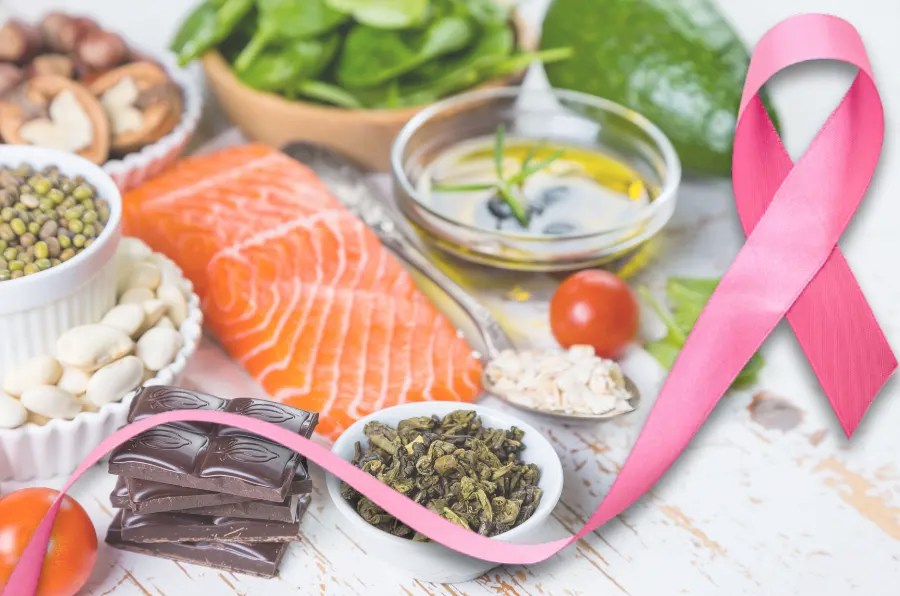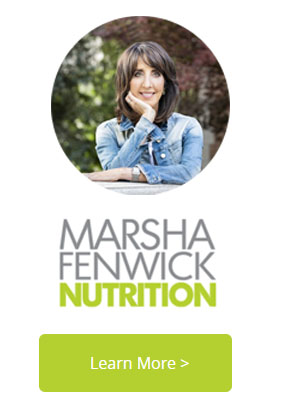Can Food Reduce Your Risk of Breast Cancer?
While no single food or diet can guarantee protection from breast cancer, your daily choices play a powerful role in supporting your overall health and lowering risk. A nourishing diet helps your body function at its best, strengthens your immune system, and can also support recovery and wellness after treatment.
Why Diet and Lifestyle Matter
Maintaining a healthy weight and following a balanced diet rich in whole, plant-based foods can help reduce the risk of breast cancer. According to the American Cancer Society, excess body fat is linked with an increased risk of breast cancer after menopause and may also contribute to recurrence in women previously diagnosed with the disease. 1
Research suggests that eating plenty of vegetables, fruits, whole grains, and legumes—while reducing highly processed and high-fat foods—supports a lower overall risk of breast cancer. 2
In contrast, diets high in refined carbohydrates, saturated fats, and processed meats are associated with less favourable outcomes. Maintaining a healthy body weight through mindful eating and regular physical activity remains one of the most consistent protective factors identified in research.
The Science on Fat and Breast Cancer Risk
Studies have explored whether a low-fat diet can help reduce the risk of breast cancer or its recurrence. A meta-analysis found that breast cancer survivors who followed a low-fat diet had a 23% lower risk of recurrence and a 17% reduction in overall mortality. 3
However, large clinical trials such as the Women’s Health Initiative found no significant difference in invasive breast cancer rates between women who reduced fat intake and those who did not. 4 These findings suggest that fat reduction alone may not be enough—it’s the overall dietary pattern and lifestyle that matter most.
Nutrients, Supplements, and Whole Foods
Currently, there is no strong evidence that any particular food or supplement can prevent breast cancer or reduce recurrence risk on its own. 5 The best approach is to get your nutrients from a balanced, varied diet.
Fruits, vegetables, and whole grains provide essential vitamins, minerals, and antioxidants that support healthy immune and hormone function. If supplementation is needed—for example, to meet calcium or vitamin D requirements—it’s best to consult with a nutritionist or healthcare provider.
Practical Nutrition Tips for Breast Health
Nutritionists and Certified Cancer Coaches often recommend the following 6 habits to support long-term breast health:
- Maintain a healthy weight for your body type and frame.
- Eat at least five cups of fruits and vegetables daily, focusing on color and variety.
- Limit total fat intake to around 25–30% of your daily calories and reduce saturated fats.
- Choose healthy fats such as omega-3s from salmon, walnuts, and flaxseeds.
- Avoid trans fats, processed meats, and charred or smoked foods.
- Limit alcohol, as even small amounts have been linked with increased breast cancer risk. 6
Diet and Recovery After Diagnosis
For women who have had breast cancer, diet continues to play a crucial role in recovery and long-term wellness. A “prudent” diet—high in whole grains, vegetables, and lean protein—has been associated with improved outcomes in survivors. 7 In contrast, a “Western” dietary pattern—high in processed meats, refined grains, and sugary foods—has been linked with poorer prognosis. 8
The Bottom Line
No food or supplement alone can prevent or cure breast cancer. But an overall healthy lifestyle—balanced nutrition, physical activity, maintaining a healthy weight, and limiting alcohol and processed foods—can reduce your risk and support your long-term wellbeing.
If you’re interested in creating a nutrition plan tailored to your individual needs, please reach out to me at marsha@marshafenwicknutrition.com for personalized guidance and support.
References
1, 6. American Cancer Society. (2023). Diet and Physical Activity: What’s the Cancer Connection? Retrieved from https://www.cancer.org
2, 8. Zhang, F. F., et al. (2022). Dietary patterns and breast cancer survival: a systematic review. Frontiers in Nutrition. https://pmc.ncbi.nlm.nih.gov/articles/PMC8839871/
3. Chlebowski, R. T., et al. (2014). Low-fat dietary pattern and breast cancer mortality in the Women’s Health Initiative randomized controlled trial. J Natl Cancer Inst Monogr.
4. Prentice, R. L., et al. (2011). Low-fat dietary pattern and risk of invasive breast cancer: the Women’s Health Initiative randomized controlled dietary modification trial. J Natl Cancer Inst, 103(19), 1–13.
5. Breastcancer.org. (2022, June 29). Can Food Reduce Your Risk of Breast Cancer? Retrieved from https:/www.breastcancer.org
7. Kroenke, C. H., et al. (2018). Diet quality and breast cancer survival. JNCI Cancer Spectrum, 2(4). https://pubmed.ncbi.nlm.nih.gov/29887784/
Marsha Fenwick, C.N.P. R.R.T.
Marsha is not your typical nutritionist. She began her career 20 years ago as a Registered Respiratory Therapist. Later, she earned her certifications as a Registered Nutritional Consultant Practitioner, Certified Nutritional Practitioner, and Registered Orthomolecular Health Practitioner. Marsha is also a Certified Cancer Coach. Her clinical practice specializes in: sustainable healthy weight loss, digestive health, women's hormones, diabetes, heart health, and cancer prevention and recovery. Contact Marsha today for more information and to book a FREE 15 minute nutritional consultation.







